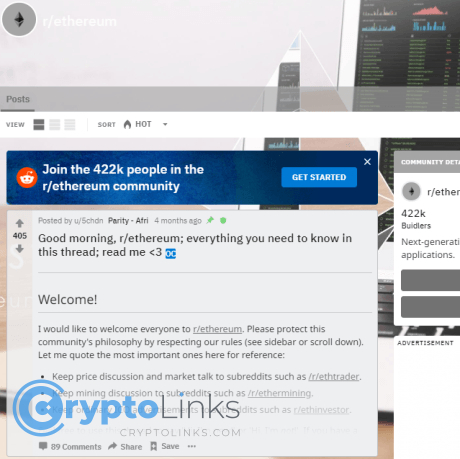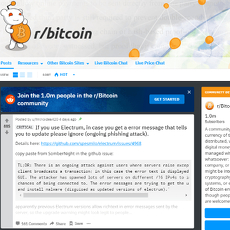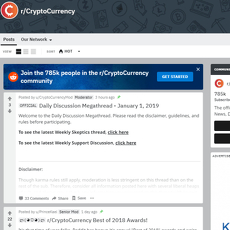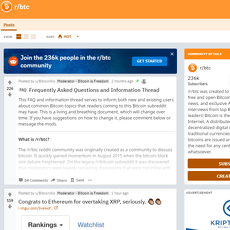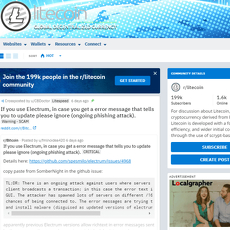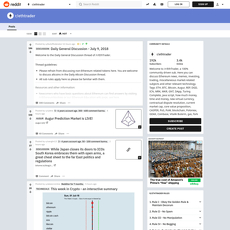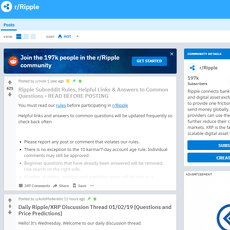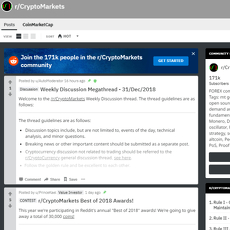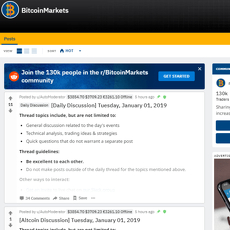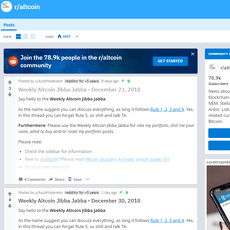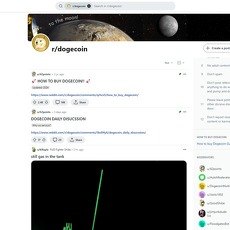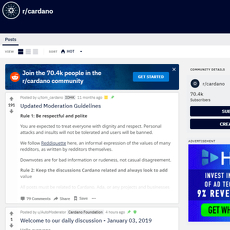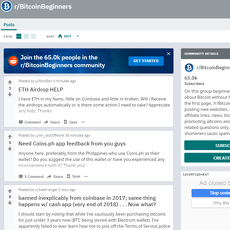r/ethereum Review
r/ethereum
www.reddit.com
r/Ethereum Review Guide: Your No‑BS Roadmap to Reddit’s Biggest ETH Hub (What to Read, What to Skip, + FAQ)
Ever open r/Ethereum and think, “Where do I even start?” If you want real Ethereum insights without getting buried in noise, you’re in the right place. I built this guide to help you cut straight to quality: learn faster, spot credible posts, avoid scams, and leave each session smarter than you started.
In a few minutes, you’ll know which threads to follow, which filters actually save time, what the rules really mean (in plain English), and how to turn r/Ethereum into your daily ETH edge—whether you’re building, investing, validating, or just getting started.
Quick promise: This isn’t another “Reddit basics” post. It’s the practical playbook I use to extract real Ethereum signal from r/Ethereum—without spending hours scrolling.
Describe problems or pain
Let’s be honest—r/Ethereum is amazing, but it’s not plug‑and‑play. Here’s what trips most people up:
- Too many posts, not enough signal. Research and core dev updates sit next to opinions, hot takes, and low‑effort headlines. It’s easy to miss the good stuff.
- Confusing rules. Price talk, promos, beginner questions, and breaking news all have specific homes. Post in the wrong place and your thread vanishes.
- Risk of scams and fake “alpha.” DM bait, fake giveaways, and malicious links still show up. Crypto crime data backs this up—scams remain a top revenue source for bad actors, according to multiple industry reports.
- Jargon overload. EIPs, L2 roadmaps, staking mechanics, client releases, “proto‑danksharding”—it’s a lot without a plan.
Result? You scroll for 30 minutes, learn nothing new, and miss the one update that actually mattered—like an EIP milestone, a Geth client release, or a security incident with real implications.
Promise solution
Here’s what you’re going to get from this guide:
- A simple playbook to get value from r/Ethereum in 10 minutes a day—no endless rabbit holes.
- How the sub’s culture works, the content types that matter (EIPs, clients, L2s, staking, security), and where the high‑signal threads live.
- Safety checks and etiquette so you can avoid common traps and keep your account clean.
- A practical FAQ—including the crowd‑favorite “What if you bought $1,000 of ETH 5 years ago?”—so you leave with clear answers, not more tabs.
Who this guide is for
- Investors: Want context on EIPs, L2 progress, staking changes, and security events that actually move risk.
- Builders: Care about client releases, research threads, EIP discussions, and dev AMAs you can learn from.
- Stakers/validators: Need to track consensus/client updates, MEV topics, and policy proposals.
- Beginners: Looking for the right threads to learn without getting roasted—or misled.
Quick snapshot: what r/Ethereum focuses on
Think of r/Ethereum as Ethereum’s public tech and ecosystem feed. You’ll regularly see:
- EIP progress (e.g., discussion threads, links to GitHub PRs, AllCoreDevs notes)
- Client updates (Geth, Nethermind, Lighthouse, Prysm, etc.) with release notes
- L2 news (Optimism, Arbitrum, Base, zkSync, Starknet) and rollup roadmaps
- Staking topics (withdrawals, validator operations, slashing, MEV)
- Security alerts (post‑mortems, incident analyses, mitigation steps)
- AMAs and conference threads (ETHGlobal, Devcon, core dev Q&As)
Price talk is limited and often redirected to the right megathread. Promotion and referrals are typically removed. That’s a feature, not a bug—it keeps the sub useful.
Why listen to me
I spend a painful amount of time testing crypto platforms and information sources so you don’t have to. Over the years, I’ve learned a few reliable signals on Reddit that consistently point to quality:
- Source‑first posts: links to GitHub commits, EIP repos, client team blogs, or reputable research orgs.
- Context over hype: posts that explain “why it matters” (e.g., how EIP‑4844 reduced L2 fees) instead of farming karma.
- Track records: users who consistently share research, client updates, or moderation guidance—rather than one‑off hot takes.
To make this guide useful, I baked those signals into a simple structure you can reuse: a 10‑minute setup, a hit list of what to read vs. skip, rules and safety, and a practical FAQ you’ll actually care about.
Real‑world example: After the Dencun upgrade (EIP‑4844), the best r/Ethereum posts weren’t the memes—they were the threads linking to client release notes, fee data from L2 explorers, and post‑mortems from researchers. That’s the pattern we’ll learn to spot fast.
Ready to turn r/Ethereum into a high‑signal feed? Up next, I’ll explain what the subreddit really covers, who keeps it clean, and how posts bubble to the top—curious how “Hot” can mislead you while “Top (Week)” surfaces the gems?
What r/Ethereum is, who moderates it, and how content actually surfaces
If you care about Ethereum’s tech and real progress, r/Ethereum is the biggest public hub you can check without swimming through price memes all day. It’s a community of millions, but it feels oddly focused—because the rules force it to be. You’ll see research, EIPs, client releases, security updates, and serious discussion that most social feeds bury under hype.
Moderation is handled by a volunteer team (plus AutoModerator), and they are active. You can see the current mod list on the sub’s “About” page, and you’ll notice fast removals for off‑topic, price talk, referral links, and low‑effort posts. That sounds strict, but it keeps the signal high. When something breaks—like a critical client bug or a wallet drainer campaign—it usually gets stickied quickly with sources and practical steps.
“Signal beats noise. Bring sources or expect pushback.”
There’s a good reason this style works. In social platforms, early votes can distort outcomes; a randomized experiment published in Science (Muchnik, Aral, Taylor, 2013) showed a single early upvote increased final scores by around 25% on average. Strong rules and active moderation help offset that bias so quality isn’t entirely decided by who showed up first.
Scope and culture: tech‑first, research‑heavy, with strict rules on price and promos
Here’s the sub’s unwritten contract in plain English:
- Tech > hype: Protocol research, EIPs, client engineering, L2 progress, security analysis. That’s core.
- No price talk here: Markets and macro go to r/ethfinance. Mentioning price in passing is fine; full-on TA or “is $ETH going to X?” is not.
- No promos or referrals:Airdrops, giveaways, affiliate links, Discord spam—expect removals and bans.
- Source your claims: Link to GitHub, EIPs, client repos, research notes, or reputable disclosures. Screenshots of tweets don’t cut it.
- Be helpful and on-topic: Questions are welcome—but keep them in designated threads when asked.
Think of it as a lab, not a casino. If you bring receipts, people listen. If not, you’ll get a gentle nudge—or a swift removal.
Post types you’ll see: EIPs, client updates, L2 news, staking topics, security alerts, AMAs, conference threads
- EIPs (Ethereum Improvement Proposals): Everything from historic changes like EIP‑1559 to scaling milestones like EIP‑4844 gets discussed with links to specs, rationale, and client implementations.
- Client updates: Geth, Nethermind, Erigon (execution); Prysm, Lighthouse, Teku, Nimbus (consensus). Expect release notes, bug fixes, and upgrade reminders with version numbers and changelogs.
- L2 news:Optimism, Arbitrum, Base, Starknet, Scroll, zkSync, and others. Roadmaps, proofs, fault/fraud proof upgrades, and data‑availability changes often get serious scrutiny.
- Staking and validation: Discussions on staking yields, MEV research, validator performance, CL/EL changes, and policy debates (e.g., churn limits, penalties, decentralization metrics).
- Security alerts: Drainer campaigns, malicious packages, phishing themes, client vulnerabilities, and response timelines. Mods usually sticky credible alerts with official references.
- AMAs: Teams and researchers drop by for scheduled Q&As. Good ones link to prior talks, whitepapers, and GitHub issues so you can fact‑check live.
- Conference and event threads: Devcon, ETHGlobal, hackathons—expect consolidated threads to collect talks, notes, and standout repos.
How Reddit sorts posts, what flairs mean, and how megathreads work
Understanding the mechanics saves a ton of time:
- Hot: Reddit’s default sort. It blends score and freshness so strong new posts surface fast. Great for “what’s happening right now,” but it can miss slower‑burn quality.
- New: Chronological. Best for catching breaking releases or security alerts before they explode. I check this when a big upgrade is live.
- Top: Highest‑scoring posts over a chosen window (Day/Week/Month/Year/All). This is your curated reading list when you want depth over speed.
- Rising: Early momentum posts. Good for spotting discussions that might trend.
Flairs are your friend. The exact set evolves, but you’ll typically see tags like Research/Technical, EIP, Client Update, Security, L2, Staking, Discussion, and Help. Use them in search to filter your feed. Example: search flair:"EIP" or flair:"Security" inside the sub to get laser‑focused results.
Megathreads keep repetitive topics tidy. You’ll often find:
- Daily/weekly discussion threads: Open prompts for general questions and smaller updates.
- Help/Questions threads: Beginner or troubleshooting questions go here to avoid clutter.
- Upgrade/event megathreads: For major releases or conferences, the sub pins a central hub with key links and ongoing commentary.
Pro tip: look at the pinned posts at the top of r/Ethereum. If you only have 60 seconds, those pins usually tell you what matters today.
Where to find daily/weekly discussion threads—and when to go elsewhere
- Check the pins first: Daily/weekly threads are usually pinned with clear titles like “Discussion,” “Questions,” or event names.
- Use flairs to spot them fast: Many are tagged Megathread or Discussion.
- Route price/market talk: Head to r/ethfinance for markets, macro, and daily price threads.
- Deep builder questions: Try r/ethdev for code, tooling, and protocol‑level implementation details.
- New and learning: Ask in r/ethereumnoobies for beginner topics without worrying you’re “asking the wrong thing.”
One more thing on mechanics: Reddit’s scoring favors early visibility, which can skew outcomes. If you want quality, don’t rely on Hot alone. Jump to Top (Week/Month) and you’ll get a far better signal‑to‑noise ratio—especially for research and post‑mortems that age well.
“Why does the same type of post sometimes get removed and sometimes not?” Two common reasons: you posted outside a megathread window, or you didn’t include credible sources (e.g., no GitHub/EIP links for technical claims). Add links, use the right thread, and your odds go way up.
If the culture sounds intense, that’s because it protects your time. The sub rewards people who show their work. The good news? In the next section I’ll show you a 10‑minute setup that turns all of this into a clean, high‑signal feed you can trust. Want the exact filters, flairs, and saves I use?
Your 10‑minute setup: turn r/Ethereum into a high-signal feed
If you’ve ever opened r/Ethereum and felt the firehose blast you in the face, good—your instincts are right. The feed is busy, the topics are technical, and you don’t have time to read everything. The fix isn’t more time; it’s better filters.
“In crypto, attention is a currency. Spend it on sources, not slogans.”
Here’s the exact 10‑minute setup I use to make r/Ethereum feel like a curated research feed, not a scrolling trap.
Sorting that works: use Top (Week/Month) for quality, New for fresh news, and search with flairs
1) Start with Top → Week or Month (3 minutes)
- On desktop or mobile, switch the sort from Hot to Top, then choose This Week or This Month. This instantly removes most noise and surfaces the most upvoted technical content and explainers.
- Open 3–5 posts with flairs like EIP, Research, Client Update, or Security. These often include EIP discussions (e.g., EIP‑4844, EIP‑7702), client releases from Geth/Nethermind/Lighthouse/Prysm, and safety notes from devs.
- Real win: during the EIP‑4844 rollout, the most useful Q&A and client readiness notes consistently lived in Top (Month). One pass kept me up to speed without chasing every hot take.
2) Scan New for the last hour (3 minutes)
- Flip to New and skim the first ~30 posts. You’re hunting for breaking items: client release tags, security alerts, AMA announcements, or AllCoreDevs notes.
- Tap the Filter by flair chips under the sub’s header (on mobile: “About” → “Posts” if you don’t see them). Check Security, EIP, or Research to narrow the stream fast.
- Quick search trick: use keywords like “client release”, “ACD” (AllCoreDevs), “post-mortem”, or “security advisory” in the sub’s search bar, then toggle New or Top as needed.
3) Use targeted searches (2 minutes)
- In the r/Ethereum search bar, try:
- site:eips.ethereum.org — threads referencing official EIPs
- author:TimBeiko or author:JustinDrake — posts from core contributors/researchers
- “EIP-” — catch new EIP-numbered discussions
- “security” OR “vulnerability” — safety-related posts
- Save these searches so you can launch them in one tap. On mobile, you can enable notifications on saved searches to get pinged when new results land.
Why this works: User research from the Nielsen Norman Group shows readers typically consume 20–28% of the words on a page. The only way to win is to scan smart, not read everything.
Follow the right threads: daily discussion, help threads, security alerts, and AMAs
4) Hit the pinned posts first (1 minute)
- Most days, mods pin high‑signal threads at the top: Daily Discussion/Questions, Security Alerts, AMA announcements, or event megathreads. Open anything pinned before browsing the feed.
- For AMAs, use the Follow button (bell icon) on the thread so you get notified when answers drop. If you’re old‑school, leave a comment with RemindMe! 24 hours “AMA answers” to get a bot reminder.
5) Use megathreads correctly (1 minute)
- Tech questions? Put them in the Daily Discussion/Help thread. It’s where devs and knowledgeable users are actually looking for questions—your odds of a good answer go way up.
- Security posts get special attention. If you see anything labeled Security or Alert, open it immediately, then check for confirmations from client teams or EIP editors.
How to spot credible sources, save posts, set up alerts, use RES, and build a personal watchlist
6) Trust signals that actually mean something
- Canonical links: Strong posts often link to:
- eips.ethereum.org (official EIPs)
- github.com/ethereum, Nethermind, Erigon, Besu, Lighthouse, Prysmatic
- blog.ethereum.org, notes.ethereum.org, ethresear.ch
- Known contributors: Posts or comments by names like Tim Beiko, Dankrad Feist, Justin Drake, Marius Van Der Wijden, and client teams carry weight—verify profiles and history.
- Evidence over vibes: Good posts cite EIP numbers, GitHub PRs/issues, client version numbers, or call notes. If it’s big news and there’s no source, it’s probably not real.
Side note: Large peer‑reviewed analyses show false news spreads faster than truth on social networks (MIT, 2018). Different platform, same human brain—slow down on “too good to be true.”
7) Save the good, mute the junk
- Use Save on posts worth revisiting. On mobile, organize saved items into folders like EIPs, Clients, Security, and L2. On desktop, mirror this with browser bookmarks or a notes app.
- Tap Hide on low‑effort content so your session stays clean. Reddit learns a bit from your behavior.
8) Set up keyword alerts to get notified when it matters
- In the Reddit app: run a search (e.g., EIP, client release, withdrawals, fault proofs), tap Save, then toggle notifications for that saved search. You’ll get a nudge when something new matches.
- Bonus for RSS lovers: every subreddit has an RSS feed at /r/ethereum/.rss. Pipe it into your reader and filter locally by keywords.
9) Supercharge Reddit with RES (Reddit Enhancement Suite)
- Install RES on desktop. Turn on:
- Keyword Highlighter: highlight EIP‑ patterns, security, ACD, client release, MEV, PBS, Verkle, EOF
- Filter Submissions: hide posts with words like giveaway, airdrops, referral, price, moon
- User Tags: tag core devs and researchers so their comments pop
- Two weeks with RES and your feed will feel eerily “pre‑sorted.” It’s night and day.
10) Build a personal watchlist (so you never ask “what did I miss?”)
- EIPs:EIP‑4844, EIP‑7702, EOF, Verkle. Saved searches: “EIP-”, site:eips.ethereum.org, flair EIP.
- Clients:Geth, Nethermind, Erigon, Besu, Prysm, Lighthouse. Saved searches: “client release”, “mainnet ready”, and repo names.
- Staking & Validators:MEV, PBS, slashing, withdrawals, SSV. Saved searches + keyword highlights.
- L2s:OP Stack, Arbitrum, Starknet, zkSync, Scroll; terms like fault proofs, validity proofs, decentralized sequencers.
My 10‑minute routine (summary):
- 2 min — Top (Week/Month): open 3–5 technical posts
- 3 min — New: scan with EIP/Security/Research flairs on
- 3 min — Pinned threads: Daily discussion, Security, AMAs
- 2 min — Save, follow, and add notes for anything you’ll act on
With that setup, the feed stops shouting and starts teaching. But what exactly should you read—and what should you skip without a second thought? In the next section, I’ll share my personal r/Ethereum hit list that’s saved me hours and caught more than a few “I wish I’d known sooner” moments. Ready to see it?
What to read (and what to skip): my r/Ethereum hit list
You’ve got limited time. Here’s exactly what deserves your attention on r/Ethereum—and what to scroll past without a second thought.
“Extraordinary claims require extraordinary evidence.” — Carl Sagan
Must‑watch topics: the highest signal on the sub
EIP progress — Anything with real EIP numbers and links to specifications is gold.
- Look for threads discussing shipped and in‑flight proposals with primary links to eips.ethereum.org or GitHub.
- Examples worth tracking: EIP‑4844 (proto‑danksharding, shipped in Dencun), debates like EIP‑3074 vs. EIP‑7702 (EOA UX), and EIP‑7251 (increase max effective balance for validators).
- Signal tells: links to ACD (AllCoreDevs) notes, client PRs, and EF Research posts.
Client releases — These are the backbone of network reliability.
- Execution clients: Geth, Nethermind, Besu, Erigon.
- Consensus clients: Lighthouse, Prysm, Teku, Nimbus, Lodestar.
- Why read: release notes often include urgent fixes and security hardening. If you run a node or stake, this is non‑optional.
Staking policy and research — The rules around validation shape rewards and risk.
- Watch discussions on PBS (proposer‑builder separation), MEV topics, slashing policy, churn limits, and validator set changes.
- High value threads link to EF Research, client team dev calls, or formal proposals (e.g., EIP‑7251) rather than hot takes.
L2 roadmaps and performance — Post‑Dencun reality, not hype.
- Good posts show fee data and technical milestones from sources like L2fees.info and official roadmaps (Arbitrum, Optimism, Base, Starknet, Scroll, zkSync).
- Useful signals: Optimism’s Superchain updates, Arbitrum’s Stylus progress, zk rollup proof systems, data availability research (e.g., peerDAS).
Security incidents and post‑mortems — Where lessons hide.
- The best posts link to root‑cause writeups, client issue trackers, or auditing reports, not just headlines.
- Look for level‑headed summaries on client bugs, finality hiccups, sequencer downtime, bridge risks, and address‑poisoning scams.
- Reality check: independent analyses consistently show scams and exploits remain a multi‑billion‑dollar problem in crypto; Chainalysis’ annual crime reports are a sober reference point.
Threads that consistently teach you something
Research roundups
- Weekly or monthly summaries that link to EF Research posts, client PRs, and academic writeups. These compress hours of reading into minutes.
- Pro tip: if a roundup cites primary sources and timestamps ACD calls, it’s worth your time.
Dev updates from client teams
- Short changelogs, release candidates, or “call notes” threads. Expect concrete details: commit hashes, version numbers, and migration notes.
- Great for building your personal changelog of what actually shipped vs. what’s “planned.”
Post‑mortems
- These are gold. Look for timelines, blast radius, mitigations, and “what we’ll do next” sections.
- Red flag removed: if a thread lacks a root cause or links to sources, treat it as incomplete.
AMA summaries
- AMAs with client devs, researchers, or L2 teams can be noisy. The summaries are where the meat is: distilled answers, clear takeaways, and direct links to commits/EIPs.
- Bookmark summary comments with timestamps so you can retrace claims later.
What to skip every time
- “Too good to be true” giveaways — No legit Ethereum team asks you to send ETH to receive more ETH. Ever.
- DMs from strangers after you comment — Classic bait. Scammers monitor threads and pounce.
- Link shorteners (bit.ly, tinyurl) to wallets, dapps, or airdrops — High phishing risk. If it isn’t a clear domain, don’t click.
- Referral or invite spam — Low‑effort farming with zero educational value.
- Low‑effort price posts — The sub is tech‑first. Price talk belongs elsewhere; you won’t learn much from charts-without-context.
Why be ruthless? An MIT study in Science found that false news spreads faster than truth on social platforms. Crypto isn’t immune—if anything, the incentives make it worse. Curate hard.
Before you act: 30‑second verification checklist
- Source link: Is there a primary source? EIP page, GitHub PR, official blog, or EF Research post. No source, no action.
- Author credibility: Check user history and flair. Do they regularly post technical content, or is the account brand‑new?
- Cross‑check: Search the same claim on client repos or reputable trackers (EIPs site, release pages, L2 status pages).
- Comments signal: Are known contributors correcting or endorsing the info? Silence or confusion = proceed carefully.
- Link hygiene: Avoid shortened URLs; hover to preview; when in doubt, paste into a sandboxed browser profile.
- Timing: Is this speculative (“rumor,” “leak”) or confirmed (tagged release, merged PR, approved EIP status)? React accordingly.
- Your exposure: If acting requires a wallet connection or contract interaction from a Reddit link, stop and re‑navigate from the project’s verified site.
Want the exact rules, etiquette that keeps you safe, and the OPSEC basics Reddit won’t teach you by default? That’s next—ready to bulletproof your routine before the next “can’t‑miss” thread hits your feed?
Rules, etiquette, and safety: how not to get burned (or banned)
The big rules in plain English
You’ll get far more value from r/Ethereum if you respect how the sub works. It’s tech-first, research-heavy, and allergic to hype. Here’s the short version I follow:
- No promos, no shilling. Don’t post referral links, airdrops, giveaways, or “free mint” pitches. If your post benefits you financially, assume it’s not allowed. Check the sub rules first.
- Keep price talk minimal and in the right place. Macro and market chat belongs in megathreads or in related subs like r/ethfinance. A one-off “ETH to $X?” post will disappear fast.
- Source your claims. If you say an EIP is live or a client pushed a release, link the EIP, the GitHub PR, or the client team’s post. No source = low signal = likely removed.
- Stay on topic. Ethereum tech, research, clients, L2s, staking, security, events, and ecosystem coordination are in-scope. Off-topic news and politics aren’t.
- Use flairs and megathreads. Help questions, price chat, support tickets, and AMAs typically live in the daily/weekly threads. Posting them solo often triggers AutoMod removal.
“Trust, but verify. Then verify again.” In crypto, the second verification is usually the one that saves you.
Staying safe (what I personally refuse to do on Reddit)
I’ve seen the same traps for years. They’re predictable—and expensive. Here’s how I stay clean:
- I never connect a wallet from a Reddit link. If a post or comment says “connect to claim,” I close the tab. I only access dapps by manually typing the URL or using trusted bookmarks.
- I never sign unknown approvals. If a site asks for “SetApprovalForAll,” an unlimited “Permit,” or any blind signature I didn’t expect, I cancel. Use a hardware wallet, read what you’re signing, and review approvals at revoke.cash.
- I verify contract addresses in three places minimum: the project’s official website, their GitHub or docs, and a trusted explorer like Etherscan (look for verified source, socials, and warnings). If those don’t match, I’m out.
- I check user history before trusting any tip. Click the profile. Is it new? All comments pushing the same link? Karma farm vibes? Hard pass.
- I report scams immediately. Hit “Report” → “Scam/spam.” Moderators remove a lot, but community reports speed things up.
Why so strict? Because phishing is still the #1 crypto attack vector. Multiple 2024 security reports (Immunefi, CertiK, Chainalysis) point to social engineering and malicious approvals as leading causes of loss—adding up to billions across ecosystems. Scammers don’t beat code; they beat people.
Real posts that should set off alarms
- “Official Airdrop — claim before snapshot!” No credible airdrop is announced first by a throwaway Reddit account. Real teams post on official sites and verified socials. If the timeline feels rushed, it’s engineered to stop you thinking.
- “Critical wallet sync to restore funds.” No legit tool needs a “sync” to “restore” or “upgrade” your wallet. That consent screen usually hides a wallet-drainer approval.
- “DM me for whitelist / private round.” Real teams don’t cold-DM strangers from Reddit to raise funds. Ever.
- Link shorteners. If a link is masked (bit.ly, tinyurl) and not from a reputable poster, I don’t touch it. I want to see the domain before I click.
Why your post vanished (and what to do about it)
If something you share disappears, don’t take it personally—AutoMod is strict for a reason. Here’s what usually happened:
- Wrong topic, wrong place. Price chat, beginner support, or “Is now a good time to buy?” belongs in megathreads or sister subs.
- No flair or wrong flair. The sub uses flairs to organize. Select the right one before posting.
- No sources. Claims without links get nuked. Add GitHub/EIP/official docs and resubmit.
- Low-effort or self-promo. One-line hot takes, referral codes, or promo-heavy posts rarely survive.
When in doubt, message the mods politely, fix the issue, and try again. Don’t argue your way into a ban.
How to ask questions without getting roasted
- Show what you’ve tried. “I read EIP-4844 overview + this Nimbus note; still confused about blob fees—can someone explain like I’m five?” gets useful answers.
- Use the right thread. Daily/weekly discussion or help megathreads are designed for this. Off-thread questions feel spammy and are easy removals.
- Be specific. “How do I stake?” is vague. “Solo staking vs. DVT pools: what operational risks differ for a home validator?” gets smart responses.
OPSEC on Reddit: protect your identity and your coins
- Separate identities. Don’t tie your Reddit to your ENS, GitHub, or Twitter if you don’t need to. Keep your real-world identity off your on-chain activity.
- Don’t post addresses or seed fragments. Not even for “debugging.” Redact anything sensitive in screenshots. Remove image EXIF data before uploading.
- Watch your patterns. Bragging about big wins, showing validator dashboards with IPs, or timestamped photos can leak more than you think.
- Two-factor everything. Secure Reddit and email with app-based 2FA (not SMS). Your Reddit account can be a stepping stone to your other accounts.
Your quick safety toolkit
- Approvals: revoke.cash to review/remove ERC-20/721 approvals
- Contracts & teams: Etherscan, project GitHub, official website/docs
- Link checks: Manually type URLs, or scan with VirusTotal if you’re unsure
- Network safety: Use Chainlist to add RPCs, not random popups
- Post verification: Cross-check with reputable researchers, client teams, and the EIPs site before acting
I keep this page bookmarked and run through it whenever something “urgent” pops up. Urgency is a tactic—good info survives a five-minute check.
Want to turn these habits into a tailored plan for your role—investor, builder, validator, or beginner—and get straight answers to the questions people actually ask? Keep going. Which group do you think leaves the most alpha on the table by using r/Ethereum the wrong way?
Who gets the most value—and a practical FAQ people actually ask
Investors, builders, validators, beginners: what each group should focus on and follow
I’ve watched r/Ethereum reward different people for different reasons. If you skim with purpose, it becomes a free edge. Here’s the quick map I personally use when I’m wearing each hat.
Investors (long‑term, thesis‑driven):
- Watch: EIP progress threads (especially anything touching gas, execution/consensus changes), client release notes, security incident post‑mortems, and L2 adoption updates.
- Why it matters: Protocol changes can shift ETH’s utility, fee dynamics, and narrative. For example, EIP-1559 reframed fee burns; EIP-4844 (proto-danksharding) lowered L2 costs and boosted usage—threads around these taught far more than headlines ever did.
- Filters that work: Search EIP numbers (e.g., “EIP-4844”), scan flairs like Research, Dev Update, or Security, and save weekly research threads for weekend reading.
- What I skip: low‑effort price chatter or “macro takes” with no sources. When a post links to GitHub, clients, or research teams, it’s usually worth a look.
Builders (smart contracts, tools, infra):
- Watch: client/releases (Geth, Nethermind, Besu, Prysm, Lighthouse, Teku), EVM/EOF discussions, testnet/Devnet calls, security advisories, L2 roadmap posts, and AMAs with client and research teams.
- Pro tip: Before an AMA, read the linked EIPs or specs and prepare 1–2 focused questions. You’ll get better answers and sometimes direct follow‑ups from core contributors.
- Quality signals: links to specs, test vectors, reproducible repos, and discussion on fee markets, builder/relayer changes, or cross‑domain messaging.
Validators/Stakers:
- Watch: slashing reports, MEV‑Boost advisories, client incompatibilities, upgrade timing posts, and fee recipient/withdrawal policy threads.
- Why it matters: A single bug or misconfig can cost you. Posts that summarize recent consensus changes—or warn about version mismatches—save real money.
- Routine: After any client release or network upgrade date is announced on r/Ethereum, scan comments for edge cases (people post logs, known issues, and fix confirmations fast).
Beginners (curious but not sure where to start):
- Watch: daily/weekly discussion threads and beginner‑tagged Q&As. Look for “Explain like I’m five” posts on EIPs and L2s.
- Game plan: Read one EIP summary a week, one L2 explainer, and one security PSA. That cadence compounds. And always cross‑check with the official Ethereum docs.
- Rule of thumb: If a link asks you to connect a wallet or sign something, stop. Ask the thread or a mod before you act.
FAQ highlight: “What if you bought $1,000 of Ethereum 5 years ago?”
Short answer: it depends a lot on your start and end dates—but the ballpark many people reference is roughly a 7–12x range if you caught a mid‑2020 entry and held through a strong market. A common headline figure you’ll see is about ~11x.
Here’s a simple way to sanity‑check the math without spreadsheets:
- Pick a rough historical price from ~5 years ago. In mid‑2020, ETH was around ~$350.
- $1,000 / $350 ≈ 2.86 ETH.
- Now multiply by a recent ETH price. If ETH were ~$4,000, that’s ~2.86 × 4,000 ≈ ~$11,440.
That’s the “~11x” people quote. If ETH was ~$2,500 when you checked, that same bag would be ~2.86 × 2,500 ≈ ~$7,150. Timeframes change outcomes fast.
Important: ETH has historically seen brutal drawdowns (80%+ in prior cycles). The ride from $1,000 → $11,400 wasn’t a straight line. Past performance is not a promise. This is not financial advice.
If you want a plain‑English explainer that walks through this kind of back‑of‑the‑napkin ROI, check Bitget Academy’s retrospective examples here: bitget.com/academy. The key is to understand the volatility and how entry/exit points change the math.
More quick FAQs I get all the time
• When’s the best time to check r/Ethereum?
Right after core dev calls, client releases, or major conferences (Devcon, ETHGlobal). The first 24 hours after a client tag hits GitHub is when real‑world upgrade notes and edge cases land in the comments.
• How do I cut out price noise?
Use search and flairs. Filter for flairs like Research, Dev Update, Security, AMA. Add keywords like “EIP-”, “client release”, “post‑mortem”, “advisory”. Skip posts with shortened links, bold promises, or no sources.
• Where do I find EIP timelines?
Combine r/Ethereum discussion with canonical sources. Check the official EIPs site (statuses: Draft, Review, Last Call, Final) and AllCoreDevs notes on github.com/ethereum/pm. On the sub, search for the EIP number to see community context and rollout chatter.
• How should I prep for an AMA?
Read the linked research/spec first, write your question in one sentence, add one line of context, and include a source. Upvote good questions so experts focus on the highest signal. After the AMA, look for a community summary thread—those catch answers you missed.
• I spotted a scam—what now?
Don’t click anything. Hit Report → “Spam or scam,” drop a quick note, and leave a warning comment without linking the malicious URL. If it mentions contracts, verify on Etherscan before saying anything definitive. When in doubt, message the mods. Screenshots help.
Want a dead‑simple weekly routine that keeps you current in 10 minutes—without living on Reddit? I’ve got a checklist I use myself. Ready for it?
My verdict on r/Ethereum: is it worth your time in 2025?
Who should subscribe, how often to check it, and the realistic value you’ll get
If you care about Ethereum’s tech, governance, or the health of the ecosystem, yes—subscribe. If you’re only chasing price calls, you’ll be happier in r/ethfinance.
What you get here, consistently:
- Early signals on upgrades and client releases. When Dencun (EIP‑4844) rolled out, the best threads linked straight to Ethereum Foundation posts and client notes, often hours before news sites summarized them.
- Smart context from people who actually build or run the network—client devs, researchers, and validators who show their work with GitHub PRs, EIPs, and testnet data.
- Fewer costly mistakes. You’ll catch security alerts, deprecated tooling, and migration reminders before they bite. I’ve seen multiple scam “staking dashboards” and fake “points” sites get flagged fast, saving folks from connecting wallets.
How often to check:
- Builders: 5–10 minutes daily or every other day. New posts can surface breaking changes and EIP discussions that affect your backlog.
- Validators/Stakers: 3 times a week. Skim for client release posts, incident reports, and MEV/relay chatter.
- Investors/Analysts: 2–3 times a week using Top (Week/Month). Focus on EIP progress, L2 roadmaps, and credible post‑mortems.
- Beginners: Weekly. Read the top educational threads and official links; jump into the help/discussion threads when you’re stuck.
What not to expect: secret “alpha,” guaranteed airdrops, or spoon‑fed financial calls. Expect 1–2 genuinely useful insights per week that make you smarter about Ethereum’s direction, risks, and how the network actually runs.
Why I’m confident: credible sources show up here, and scams get spotted quickly. Still, social platforms amplify hype; a widely cited 2018 Science paper found false stories spread faster than true ones. Crypto scammers also adapt fast—Chainalysis’ 2024 report shows phishing and impersonation remain active threats. r/Ethereum’s rules and culture help, but your own filters matter.
Bottom line: subscribe if you want signal on Ethereum’s tech and ecosystem. Skim smart, verify sources, and you’ll turn Reddit time into real understanding.
A simple weekly routine: 10‑minute checklist to stay current without getting overwhelmed
- Minutes 0–2: Open r/Ethereum → sort by Top (Week). Scan titles with flairs like [EIP], [Client Release], [Security], [Research]. Open anything from client teams (Geth, Nethermind, Besu, Lighthouse, Prysm, Teku, Nimbus) or EF researchers.
- Minutes 2–4: Check the weekly discussion or current megathread. Search inside it for “Pectra,” “EIP‑7702,” “PBS,” “MEV‑Boost,” or your focus areas (staking, L2s, wallets).
- Minutes 4–6: Quick security pass. Look for phishing alerts, wallet drainer warnings, or incident write‑ups. If a link looks off, skip it. If people post contract addresses, verify on Etherscan or official GitHubs before you touch anything.
- Minutes 6–8: Save 1–2 posts that impact you. Examples: a client hotfix, an EIP call recap, or an L2 upgrade timeline. Add a calendar reminder if it includes a date (testnet forks, mainnet targets, AMA times).
- Minutes 8–10: Skim comments from credible handles (client maintainers, EF researchers, L2 core teams). Note disagreements—those threads often teach the most. Report obvious scams; answer one beginner question if you can.
Optional monthly pass (15 minutes): sort by Top (Month) and read the top 5 posts end‑to‑end. You’ll catch the bigger themes without grinding every day.
Final take
r/Ethereum is the best public forum for Ethereum’s tech and ecosystem in 2025—if you use it right. Follow the right threads, verify sources, respect the rules, and you’ll come away with practical knowledge: what’s shipping next, what’s risky now, and where consensus is forming.
Want a shortcut? I’ll keep updating this guide with new tips and standout threads here: https://cryptolinks.com/news/. If you’ve got a thread that saved your bacon or changed your mind, send it my way—I’ll add the good stuff so we all get smarter.

